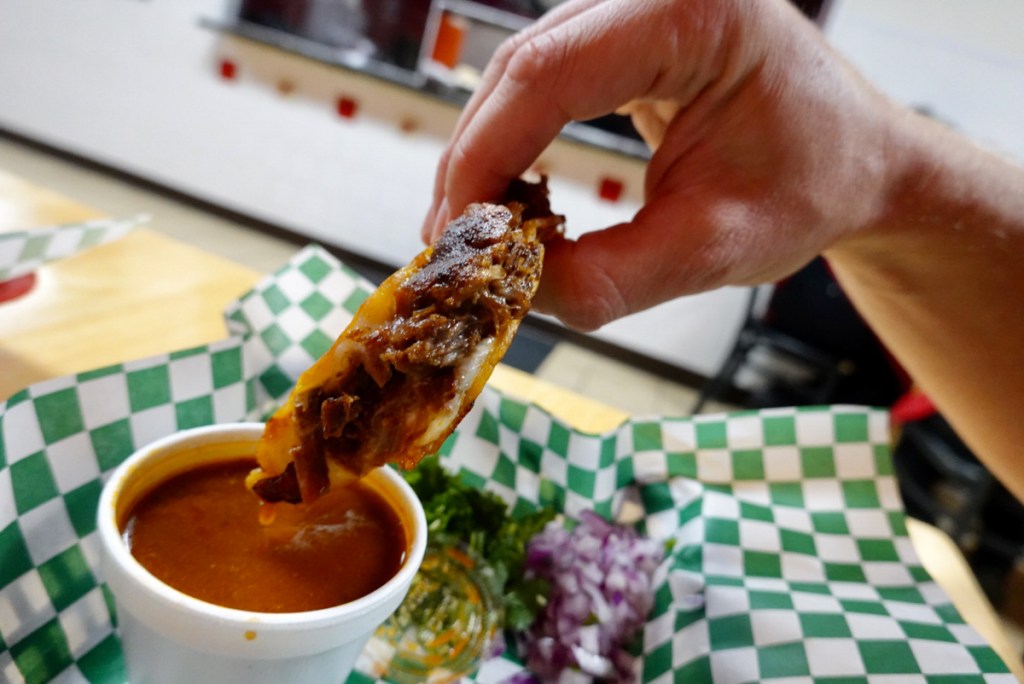“In many ways, Fresno is a city built on tacos,” Mike Osegueda, aka Mike Oz, tells me over tacos (what else?) late one evening.
If it had been someone else saying it, at some other time, I almost certainly would’ve dismissed it as the kind of mostly nonsensical hyperbole that frequently pollutes press releases. Only in this case I didn’t, because, for one, I had already spent half an evening with Oz, and by that point, I knew he wasn’t prone to that kind of soundbite speak. And for another, at that moment, that particular kind hyperbole actually made a sick sort of sense. Maybe it was the tacos.
I was sitting with Oz, co-creator of Fresno’s Taco Truck Throwdown, which will hold its 11th titular event on October 1st, in a major intersection in Fresno at the time. We were eating tacos at one of two unlicensed pop-up stands that had set up in the parking lot of a formerly vibrant commercial space. As a kid I used to come to a store at this corner to buy books. Two tents now occupied the parking lot, about 100 feet apart, both selling basically the same thing. (“These are the best tacos around, homemade tortillas!” exhorted one guy working a plancha, wearing sunglasses even though it was almost midnight).
This had been kind of a theme for the evening: eating incredible tacos from mobile taco stands in locations that seemingly didn’t have much going on there besides tacos. In LA, and most other cities that seem to have food trucks in general and taco trucks specifically, those trucks generally set up near popular bars and well-trafficked nightlife strips in order to capitalize on the foot traffic they bring. The curious anomaly of Fresno is that taco trucks seem to spring up pretty much any damn place with enough space to fit them.
We’d already been to three or four taco trucks that evening. One in the parking lot of an oil change shop, another just set up in a field on an empty lot, with lights shining like a taco beacon. Without exception, none of the locations had any obvious pedestrian traffic to speak of. Fresno, located in California’s Central San Joaquin Valley, almost the perfect halfway point between San Francisco in the north and LA to the south, is a sprawling city, spread out and suburban, like Houston or Jacksonville. I’d go so far as to say that a lot of these trucks had set up in some of the least foot-trafficked blocks in one of America’s least foot-trafficked cities. And yet, even after 10 pm on a Thursday, when we were there, most seemed to have plenty of customers, drawing from all walks of life.
Which helps explain why I could not only forgive, but engage in the grandiosity of Mike Oz calling Fresno “a city built on tacos.” Because in most places, taco trucks feel like a phenomenon designed to capitalize on nightlife. In Fresno, they feel like a phenomenon that generates nightlife. All over the city, in patches of derelict businesses and blighted blocks, ad-hoc taco stands sprung up, both licensed and non, sometimes with little more than a flat top grill and an extension cord. In one spot just east of the Tower District (one of Fresno’s oldest and probably its hippest neighborhoods) there was a defunct gas station that had been turned into a thrift store, which in turn became a taco stand after dark. This kind of grassroots mixed-use zoning happens all over the city, in a way that’s hard not to appreciate, even when some of the blocks surrounding it look like sets from Children of Men.
It’s this kind of charm — not to mention the abundance of really good tacos — that inspired Mike Oz to create Taco Truck Throwdown 12 years ago, along with Sam Hansen. Oz was a baseball writer at the time, and Hansen was a graphic designer for the Fresno Grizzlies, united by their love of tacos and a dream to create an event that could properly celebrate them. For the event, the Fresno Grizzlies minor league baseball team rebrands as the Fresno Tacos (complete with much sought-after merch) and the food trucks take center stage for a taco contest in what the Fresno Bee has called “one of Fresno’s signature events.” (There’s also music and other performances — this year’s event will have Bone Thugs-n-Harmony, Foos Gone Wild, and Lucha Extreme Wrestling)
Back in 2016, I got to be a judge, which required sampling almost 30 tacos (probably TMI, but I weighed myself before and after a bowel movement the next morning, and I was literally five pounds lighter). This year’s contest, scheduled for October 1st, has 25 entrants. Which sounds like a lot, until you drive around south Fresno for a night and see how many taco trucks there actually are out there. Oz estimates that on any given night, there are “at least a hundred taco trucks” operating within a 30-minute radius. From what I witnessed in the course of our Taco Ride Along, 100 seems conservative.
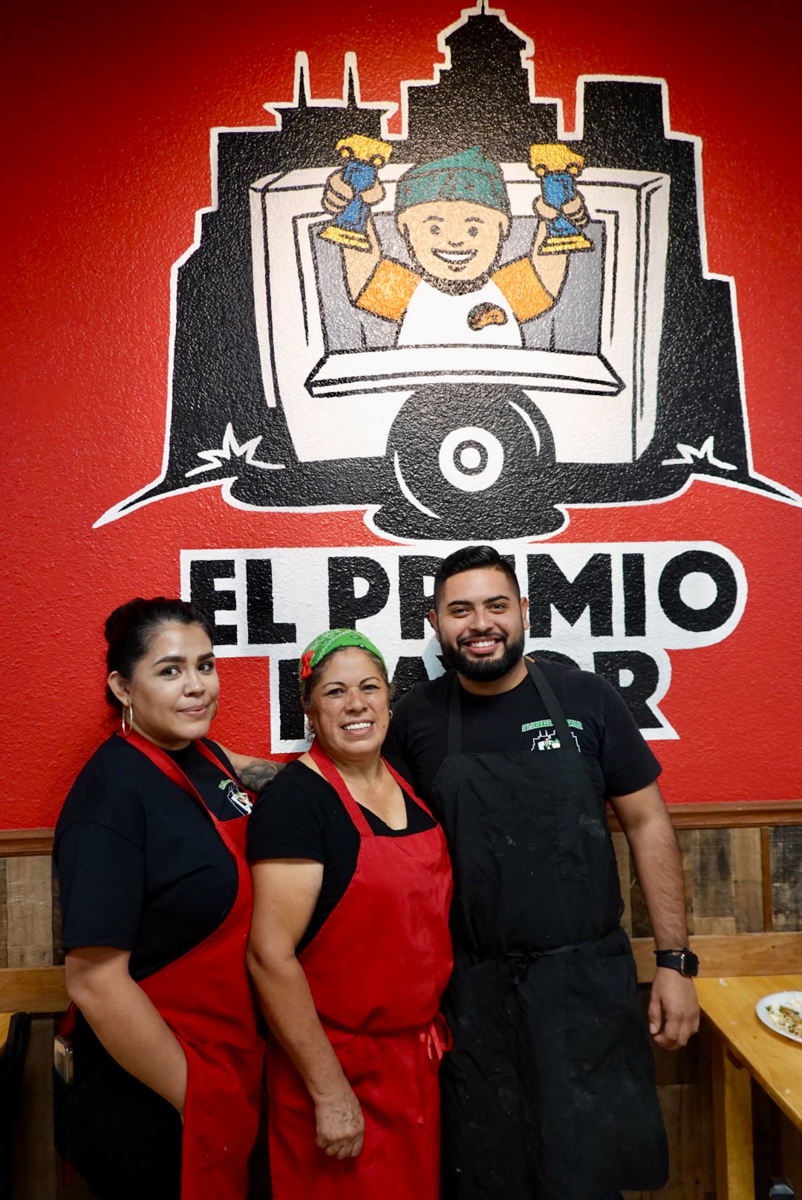
Our first stop was El Premio Mayor, currently a brick-and-mortar operation with two locations and two trucks, a burgeoning taco empire that began as a flat top grill hooked up to an extension cord running from Belén Ramirez’s apartment in the Yosemite Village Apartment complex 26 years ago. This operation eventually grew into a taco truck, and at the first Taco Truck Throwdown in 2010, El Premio Mayor took home first place.
They’ve won five more times since then, and their logo, painted on the sign out front and on the inside wall at the restaurant, is a cartoon of Belén’s son, Adrian Loza, holding up two trophies from the Taco Truck Throwdown in 2015, when El Premio Mayor swept both the judges choice and the people’s choice competitions. Oz likes to say that El Premio Mayor and La Elegante (with a Chinatown location and one truck) are to Fresno taco trucks what Pat’s and Geno’s are to Philadelphia cheesesteaks.
That logo is bittersweet now, part celebration and part tribute. Loza died less than a year after El Premio Mayor’s triumph in 2015, hit by a train, supposedly while out jogging, training for a Tough Mudder. He was 29. The family had to start new social media accounts for El Premio Mayor after he died. Loza had been the only one who knew the passwords. This kind of thing makes for big drama on The Bear, but there’s been no big rebrand or high-profile reinvention around here. No one says “yes, chef,” they kind of just carry on. El Premio Mayor did win a particularly emotional Throwdown again in 2016. They have about 20,000 Instagram followers, as of this writing, and the business seems to booming — in a modest, taco truck kind of way.
No matter how much you want to write a light puff piece about a local taco contest, it’s hard to avoid a story of tragedy. It’s been barely a year and a half since Oz himself got laid off from his job writing about baseball for Yahoo Sports. Three weeks later, the same month, his sister died in a hit-and-run accident while crossing the street in Oakland. Putting on food truck events, once his side gig, had just been promoted to his main gig. Setting out on your own often makes for an inspiring story; having it forced upon you while dealing with a personal tragedy is tough to imagine.
Oz, who promotes the Taco Truck Throwdown with the Fresno Grizzlies, as well as running Fresno Street Eats, his events and catering company, thankfully seems to be doing okay now (with his schedule, it’s easy to wonder whether he has a choice). Not that the gig ever seems to get any easier. Barely a week before 2019’s event, a 41-year-old man died during an amateur taco-eating contest at a Grizzlies game. EMTs were on site performing the Heimlich maneuver and CPR, but couldn’t save him. The coroner later reported, not surprisingly, that the man had died choking on tacos, and his son sued the team. Oz wasn’t involved in the event, though it was intended to help promote TTT, instead casting an unfortunate shadow on it.
“The completely weird, off-the-wall shit that happens in Fresno on a daily basis might be unparalleled in a city of its size,” said Jeff Passan, a Syracuse grad who worked with Oz at the Bee, to Stephen Nesbitt in Nesbitt’s profile of Oz on The Athletic from earlier this year. “There are great stories everywhere, great characters everywhere.”
Perhaps it was inevitable that Oz himself would become one. Back in 2016, in a lot of ways, he was my foil. We had similar jobs, him writing about baseball for YahooSports, me writing about movies for Uproxx. Yet he was a Bay Area kid, who’d grown up in Fremont and went to college at San Jose State, who took his first job at the Fresno Bee. He liked it so much that he’s been here ever since, inspiring most of his extended family to move down too. These days Mike Oz is basically Mr. Fresno. Meanwhile, I was born in raised in Fresno County (in Del Rey, a rural armpit so insignificant people that live 10 miles away will ask, in all earnestness, “where’s that?”), moved away at 18, and rarely spent much time there. In 2016 I was living in San Francisco, where I’d been for years.
In 2020 I married another local (and fellow Reedley High graduate) and moved back to Fresno. These days I’m trying to learn to love a place that I left late enough in life to take for granted, but early enough to realize now that I don’t actually know all that well. Oftentimes it takes an outsider to truly appreciate a place. Part of me probably hopes that seeing it through Mike Oz’s eyes will help open me up to all the good things Fresno has to offer.
“Fresno is a city that’s kind of desperate for an identity,” Oz tells me. He laughs at the way Fresnans seem to take outsized offense to any slights, any time we’re mentioned in a comedian’s punchline or late-night host’s joke. The way we hold onto mild throwaway insults for decades. I’m deleting an entire paragraph here where I catalog all the ones in my personal brain Rolodex, from Tupac to NOFX. Men’s Health named Fresno “America’s Drunkest City” in 2010 — based on largely arbitrary data, like DUIs — and city council people are still handwringing about it. (I actually kind of like it, being known for drunkenness is better than being known for nothing).
“The reality is that it’s just a place a lot of people drive through and see on signs without knowing well, that has kind of a funny name,” Oz says. “Of course, they’re going to use it in a punchline.”
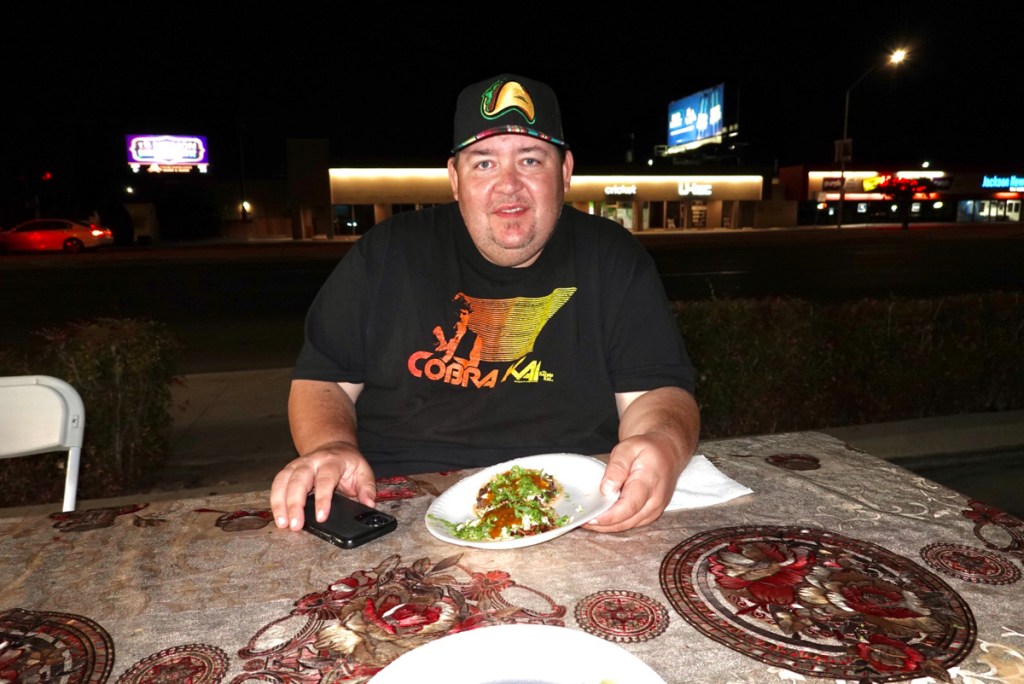
Mike Oz, in his element.
What is pretty special about Fresno, Oz likes to point out, is the taco culture. Whereas lots of other places with great tacos tend to draw immigrants from specific parts of Mexico at specific times, bringing with them the taco traditions of where they came from, like San Diego from Tijuana and Baja California for example, the San Joaquin Valley, by virtue of being the agricultural heartland of California, is constantly drawing immigrants from all different parts of Mexico who come to work on the farms. So it is that you can find taco traditions from Baja, Sonora, Sinaloa, Jalisco, Oaxaca, etc., plus traditions imported from earlier waves of immigration that evolved here. And all these slightly different and distinct taco traditions rub tortillas in closer proximity than you can find just about anywhere else.
As Oz’s TTT co-founder Sam Hansen put it in an interview a few years back, “There is a lot of evidence to prove that taco trucks were invented in the Fresno area. They were originally ‘lunchero’ trucks, which provided food for the migrant workers who were picking the produce that grows in this area. From there, the luncheros evolved into the taco trucks you see today. Some are located in the city and some are still out in the rural migrant areas like they were 50 or 60 years ago.”
I grew up with some of those luncheros, and the diverse taco culture here all squares with my own experience, even if I never quite understood the mechanisms behind it. I spent four years searching for decent chile verde living in San Diego in the early aughts, mostly to no avail. One restaurant had it on the menu, and when it came out it was just carnitas with tomatillo salsa on top, which only made me angry. Living in San Francisco, I waited in the long lines at La Taqueria in the Mission District, which at one point won FiveThirtyEight‘s crown of “Best Burrito In America.” The food was what I would consider slightly above average by Fresno taco truck standards.
Oz doesn’t expect that having great taco trucks will eventually make Fresno a tourist destination, nor do I. For one thing, I don’t know that I could in good conscience suggest that bright-eyed out-of-towners descend upon some of the iffier parts of town late at night to eat tacos off a trailer in the parking lot of a thrift store. A friend I grew up with (of Mexican descent, like Mike) describes (admiringly) part of what Mike Oz has done as “make taco trucks safe for white people.”
I’m not sure taco truck tacos should even be a destination food. To me, they’ve always been the perfect food for people in transition — a thing you grab on the way to somewhere else. Your favorite one is invariably between two places you drive between a lot, becoming your oasis along the journey. Oz mentions Jenny’s Tacos as one of his “white whales,” a truck he loves that he’s tried but failed to get to participate in the Throwdown. He discovered it because it was on his frequent route between Sunnyside and Visalia. Likewise, one of the first questions I asked when I heard about Throwdown was whether they got Tacos Morales, from Academy and 180 (who make a unique and uniquely spicy carne asada burrito that’s totally worth the heartburn if you’re ever traveling between Fresno and Reedley). Your favorite taco truck is always associated with an intersection in your mind like that.
Part of the genesis of Throwdown was trying to settle the “whose taco oasis is truly the best” arguments that inevitably characterize Central Valley life. At best, Oz hopes, Fresno and tacos could one day become as linked in people’s minds as Breaking Bad and Albuquerque.
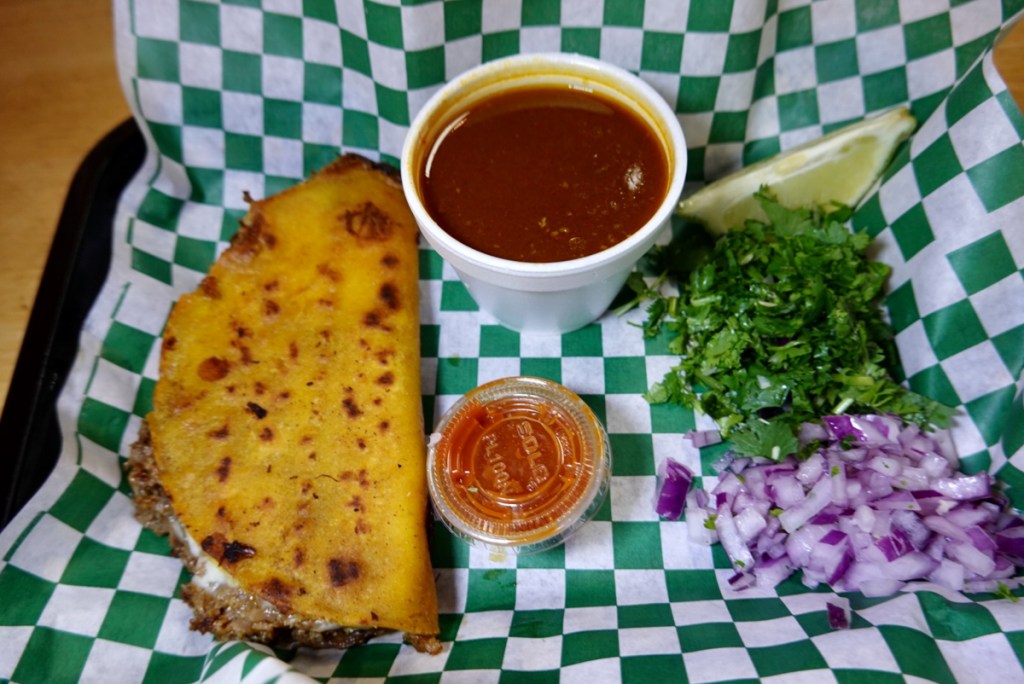
At our first stop, El Premio Mayor, we get the QuesaTaco — aka the red taco, a variant of the currently-trendy quesabirria — and a classic asada. Premio Mayor, one of the first places in Fresno to serve a quesabirria taco, does make an excellent one, served with hearty reddish jus and meat that gets caramelized towards the edges and which has a rich, almost short rib character.
Every place seems to offer a quesabirria taco these days, and El Premio’s is easily one of the best I’ve had (this simple version I had in Guadalajara a few years back is up there). And yet there’s something slightly… un-taco about quesabirria tacos. They’re very good, don’t get me wrong, and in general, we should have more foods that riff on the French dip. But the downside of all that meat and cheese stuffed in there just so is that it doesn’t leave much room for salsa and fixins.
To me, the beauty of the taco is the combination of the charred meat with the homey tortilla and the fresh salsa and crunchy veg. Quesabirria offers nice juicy meat and jus-soaked tortilla (amazing), but partly at the expense of de-emphasizing the salsa. Oz agrees, in a good taco, the salsa is as important as the meat. For the record, El Premio Mayor offers a garlicky, dusky red salsa made from chili japones, and a bright red watery one made from pure chile de arbol — both excellent. They also serve the asada with chopped onions (red) and cabbage (green), with grilled serrano pepper, caramelized onion, and lime on the side. It’s these little touches you come to appreciate. Taco trucks are like that, fundamentally the same yet infinitely varied.
From El Premio Mayor, Oz drove us down to Tacos Don Chicho, in Sunnyside in Southeast Fresno. Don Chicho’s looks about as humble as it gets, a little green trailer sitting in an empty field. This will be Don Chicho’s first year at Throwdown, and when I went, they hadn’t yet decided which of their tacos to enter into the contest — asada, adobada (marinated pork, kinda like al pastor without the spit), pollo, carnitas, birria, cuerito (pork skin), buche (pork stomach), tripa (beef stomach), cabeza (beef head), or lengua (beef tongue). I’ve always been amazed at the staggering variety of options available from a truck the size of a walk-in closet, and all for $2.50 a taco (which is somehow both insanely expensive compared to the taco trucks of my youth and ridiculously cheap by 2022 standards).
We talked to Jose, who does whatever the taco truck equivalent of “front of house” is for his parents, who still do most of the food prep for Don Chicho’s. The truck is named after his father, Narciso, aka Chicho, who brought the family here from Jalisco years ago. Narciso used to work in the fields, but at some point figured cooking tacos was easier than climbing up and down a ladder all day in 100-degree heat (though it should be said: running a taco truck doesn’t seem that much easier, albeit less physically taxing). Jose and his siblings are all DREAMers, and he tells me that the family recently had their resident status approved permanently.
Oz admits he isn’t that adventurous when it comes to taco fillings, sticking mostly to the non-offal/organ meats. I’ll go for lengua from time to time (I find it’s generally moister than carne asada), and I’ve had buche and tripa once or twice, but never cabeza. I draw the line somewhere before sesos (brains). Jose offers a quesabirria, which I accept, and ask for a lengua. And, since I figure “What better time to break my cabeza cherry than now?” I also opt for a cabeza taco. While we wait, a guy from a different taco truck (a seafood-focused one) comes in to pick up some tacos from Don Chicho’s, which feels like a high endorsement.
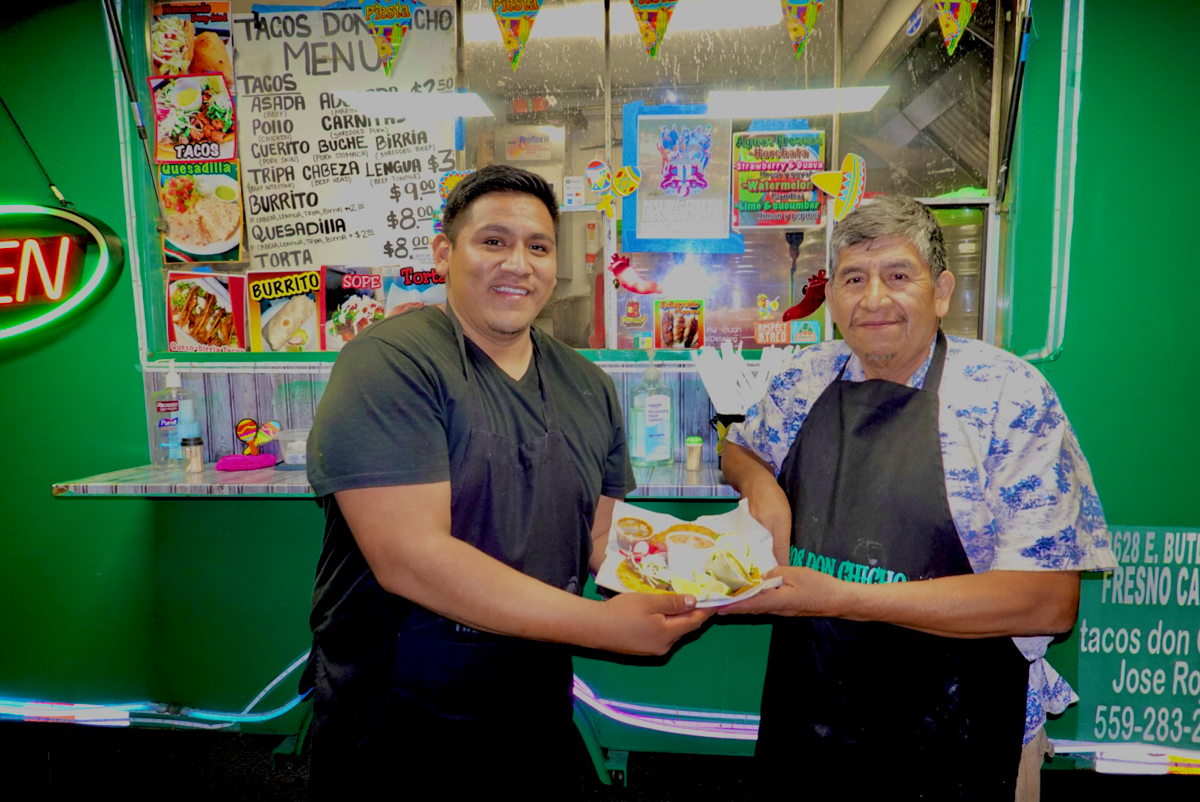
Jose and Narciso, in front of Don Chicho’s
Don Chicho’s quesabirria is crunchier than El Premio’s, though with less caramelized meat. It’s slightly less rich and flavorful, though it also has raw onions inside, which is nice. They serve their tacos with thick slices of radish and fancy cucumbers here (“It’s the little differences,” -Jules, Pulp Fiction). As for the cabeza, I think in my head I was associating it with head cheese, some kind of terrine-like thing full of weirdly chewy textures. The reality isn’t like that at all. It’s something closer to pork jowl (aka guanciale), a juicy, intensely flavorful braised meat filling that you wouldn’t know came off a skull if you didn’t ask (and once you’ve tasted probably wouldn’t care). It was the kind of taco so good you beg your friend to take a bite. Jose said they were leaning birria for their competition taco, but if I were them I’d go cabeza. I don’t know if all cabeza tacos are as good as Don Chicho’s, but I know I’ll be chasing that one for the next few years.
Mike Oz won’t handicap Don Chicho’s chances at their first Throwdown. He says he has a (slight) favorite between El Premio Mayor and La Elegante, if you really pinned him down, but that he’d kill me if I print it. Other heavy hitters include last year’s winners, Taco Pinto, who make a big shrimp taco with red cabbage and were there just six weeks after opening their truck, and Tacos La Vaporera, as well as Tacos Ama, who Oz sees as a top contender.
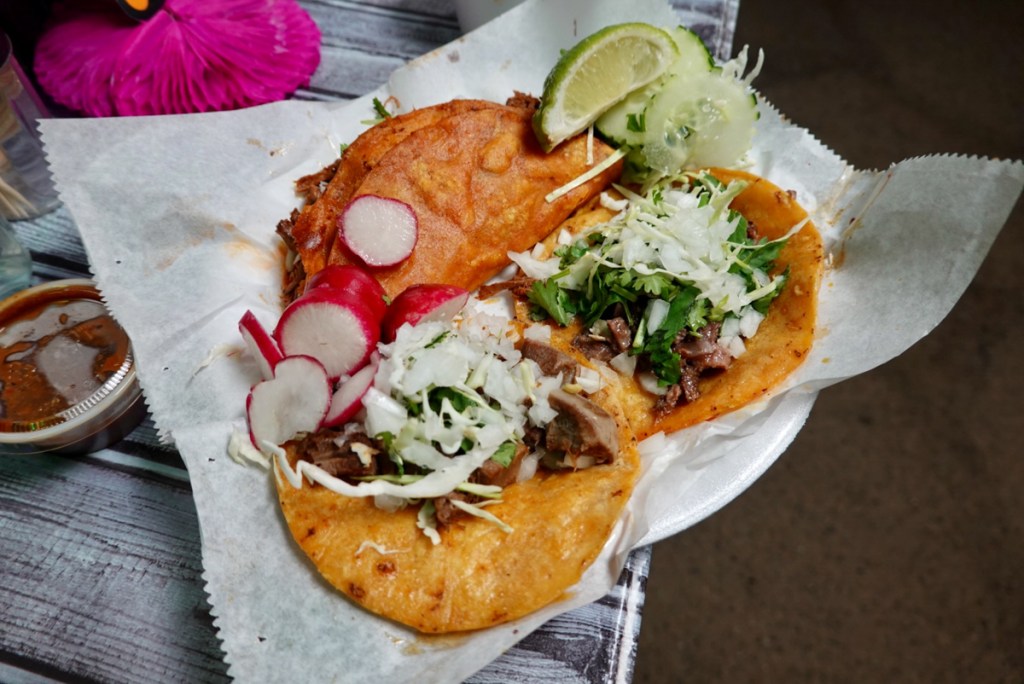
Our next stop takes us to Taqueria Corona, another green trailer with the weirdly ubiquitous stickers on the window, nearly identical to Don Chicho’s. This one has an extra axle and sits in the parking lot of a Lube Plus, whose sign implores passersby “LIKE US ON FACEBOOK,” in church-style plastic lettering. Corona serves up some of the best al pastor I’ve ever tasted, charred and juicy, on pleasantly chewy tortillas with fiery dark red arbol salsa. (My take on al pastor: average al pastor isn’t that good, probably takes a backseat to average asada or certainly birria, but good al pastor has a higher ceiling than just about any of them).
A group of well-dressed, younger Hispanic folks shows up to put in an order, looking like they’re fueling up during a night on the town. This even though there isn’t a bar or night spot within sight. They seem to be on foot which, again, makes no logical sense. We’re at a lube joint next to an airport. But in Fresno, if you grill it, they will come.
“This place isn’t even in the Throwdown,” Mike says, only half jarring me out of my pork-fueled fugue state, as al pastor juice trickles down my chin. “I just like it.”
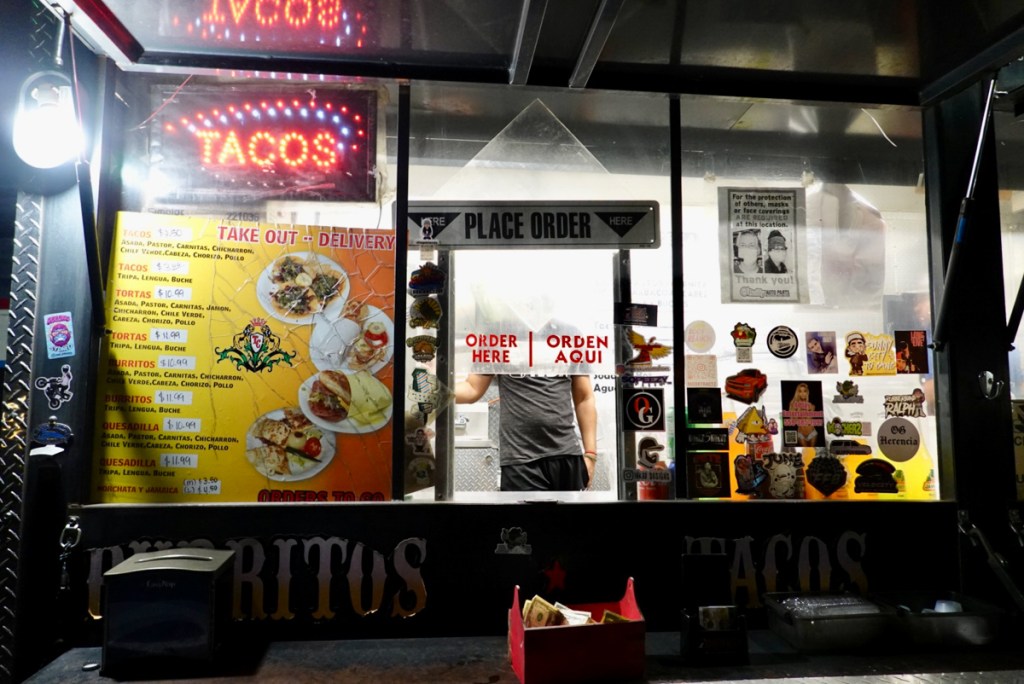
Taqueria Corona
Taco Truck Throwdown 11 takes place at Chuckchansi Park, October 1st. Vince Mancini is on Twitter.
